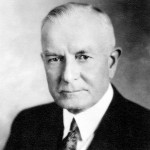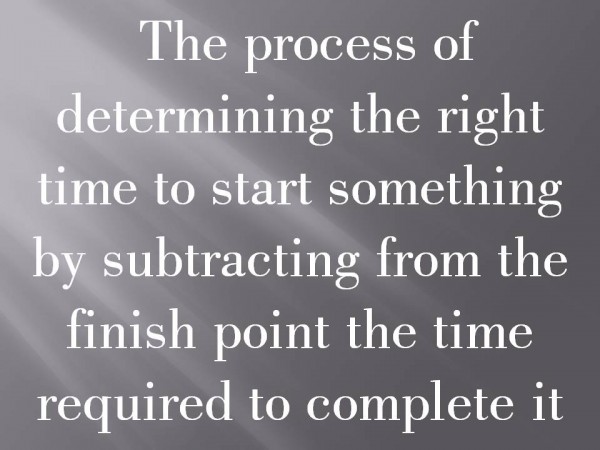““When you come right down to it, leadership is, of course, being exerted all the time in the capacity of boosting morale, confidence and all that, but leadership is most noticeable when tough decisions finally have to be made. This is the time when you get conflicting advice and urgent advice of every kind. Now this is the kind of leadership that’s often concealed from the public.… But making decisions is of the essence in leadership—that is, handling large problems whether or not you are at war or at peace. When you make these decisions it is not done with any reaching for the dramatic. It is almost everyday and commonplace. You reach a conclusion based upon the facts as you see them, the evaluations of the several factors as you see them, the relationship of one fact to another, and, above all, your convictions as to the capacity of different individuals to fit into these different places. You come to a decision after you’ve taken all these things into consideration. Then you decide and say, ‘That’s what we’ll do.’” General Dwight D. Eisenhower
— American Generalship: Character Is Everything: The Art of Command by Edgar Puryear
Leadership is hard
I learned that leadership is hard. Leadership sounds easy in the books, but it is quite difficult in real life. I learned that leadership is difficult because it is a human interaction and nothing, nothing is more daunting, more frustrating more complex than trying to lead men and women in tough times.
I learned that you won’t get a lot of thanks in return. I learned that you shouldn’t expect it.
I learned that the great leaders know how to fail. If you can’t stomach failure, then you will never be a great leader.
Admiral William Harry McRaven, US Special Operations Command, in a speech at the United States Military Academy, January 18, 2014
The Army Leader is a Teaching Leader
 Over a decade of war has changed the fabric of the U.S. armed forces. Short mobilization cycles and changing theater tactics necessitated the development of a learning culture within the organizations. This learning culture, however, is fundamentally NOT the culture that has sustained our premier forces throughout our history. As the armed forces move into a garrison environment and resources diminish, it is time for the culture to shift back to what we fundamentally are…a teaching culture.
Over a decade of war has changed the fabric of the U.S. armed forces. Short mobilization cycles and changing theater tactics necessitated the development of a learning culture within the organizations. This learning culture, however, is fundamentally NOT the culture that has sustained our premier forces throughout our history. As the armed forces move into a garrison environment and resources diminish, it is time for the culture to shift back to what we fundamentally are…a teaching culture.
General Colin Powell, in his autobiography It Worked for Me: In Life and Leadership, explains that he has been a professional speaker, trainer, and teacher his entire adult career. He explains
From my first day in my unit as an Army officer, I had to speak to and teach troops.
General Powell built his success on the enduring Army culture where leaders teach troops and other leaders. They not only learn they pass knowledge on. Instilling the desire to improve and learn is the important part of any the learning culture; A teaching organization further infuses learning with the culture of passing it on to others. Noel Tichy, author of the Leadership Engine puts it this way:
(Organizations) that consistently outperform competitors (have) moved beyond being learning organizations to become teaching organizations….That’s because teaching organizations are more agile, come up with better strategies, and are able to implement them more effectively…. Teaching organizations do share with learning organizations the goal that everyone continually acquire new knowledge and skills. But to do that, they add the more critical goal that everyone pass their learning on to others…. In a teaching organization, leaders benefit just by preparing to teach others. Because the teachers are people with hands-on experience within the organization—rather than outside consultants—the people being taught learn relevant, immediately useful concepts and skills. Teaching organizations are better able to achieve success and maintain it because their constant focus is on developing people to become leaders.
In short, leaders train leaders. (more…)
Early Christian Banquet Worship
Pliny the Younger.
They affirmed, however, the whole of their guilt, or their error, was, that they were in the habit of meeting on a certain fixed day before it was light, when they sang in alternate verses a hymn to Christ, as to a god, and bound themselves by a solemn oath, not to any wicked deeds, but never to commit any fraud, theft or adultery, never to falsify their word, nor deny a trust when they should be called upon to deliver it up; after which it was their custom to separate, and then reassemble to partake of food but food of an ordinary and innocent kind.
Guard against the lack of vision
 “You must guard constantly against those who lack vision. You must guard against the reactionary mind. Always cultivate and associate with persons of vision and with persons who believe that things are going to be better. When you do this, you take on the kind of vision, backed by the right kind of inspiration that you need if you are going to grow . . . .” Thomas Watson, Sr., 1874-1956, chairman and CEO of International Business Machines (IBM)
“You must guard constantly against those who lack vision. You must guard against the reactionary mind. Always cultivate and associate with persons of vision and with persons who believe that things are going to be better. When you do this, you take on the kind of vision, backed by the right kind of inspiration that you need if you are going to grow . . . .” Thomas Watson, Sr., 1874-1956, chairman and CEO of International Business Machines (IBM)
Army Leadership Definition
Leadership is the process of influencing people by providing purpose, direction, and motivation to accomplish the mission and improve the organization.
An Army leader is anyone who by virtue of assumed role or assigned responsibility inspires and influences people to accomplish organizational goals. Army leaders motivate people both inside and outside the chain of command to pursue actions, focus thinking and shape decisions for the greater good of the organization.
As defined in Army Doctrine Publication (ADP) 6-22, Army Leadership August 2012
Sin Through Weakness and Goodness
Bad and mediocre people are tempted to sin by their own habitual weaknesses. The earlier lies or thefts or adulteries make the next one that much easier to contemplate. Having already cut so many corners, the thinking goes, what’s one more here or there? Why even aspire to virtues that you probably won’t achieve, when it’s easier to remain the sinner that you already know yourself to be?
But good, heroic people are led into temptation by their very goodness – by the illusion, common to those who have done important deeds, that they have higher responsibilities than the ordinary run of humankind. It’s precisely in the service to these supposed higher responsibilities that they often let more basic ones slip away. – Ross Douthat, New York Times, November 13, 2011
Rules of Influence
- Live a life of undivided integrity
- Always demonstrate a positive attitude
- Consider other people’s interest as more important that your own
- Don’t settle for anything less than excellence
from Chris Widner: The Art of Influence: Persuading Others Begins With You
The Lost Art of Backward Planning
Jesus had a plan…and he executed it right on time.
As the time approached for him to be taken up to heaven, Jesus resolutely set out for Jerusalem. Luke 9:51 (NIV)
Short of the divine knowledge Jesus possessed, few of us would be able to deliver exactly on time with as far to travel and as many things to do. Along the way he taught parables, eased Martha to the better choice, confronted demons, expressed woes to the pharisees, healed people, dined with his disciples, and prayed all night before being arrested…right on time.
Granted, the things we do day-to-day don’t have eternal consequences for all of humanity, but why do we seem to always miss deadlines, cram all night to study or finish a project, or flat out miss deadlines? We’ve lost the art of backward planning.
 Backward planning is the process of determining the right time to start something by subtracting from the finish point the time required to complete it .
Backward planning is the process of determining the right time to start something by subtracting from the finish point the time required to complete it .
Here’s a simple example: It takes 2 hours to drive to your mothers and you need to be there by 7:00pm. Subtract 2 hours from 7pm and you need to leave at five. WAIT, WAIT…don’t stop reading, it gets better.
What we fail to do is apply this simple concept to more complex projects like the yearly report, your masters degree thesis, or even family panning. Here’s some simple steps to backward plan your next project.
- Determine the finish point
- List all tasks that must be done in order
- Estimate the length of each task
- Subtract each length from the finish point
Making a Change at Church: Eight (not so) Simple Steps
In a previous post I quoted John Maxell who observed that older and “insecure leaders view change as a threat rather than an opportunity. ” But what if you have to change.
Many small churches are facing declining membership because their traditions have not changed in decades. The prevailing belief is worship traditions are Biblical and any deviation must certainly be a sin. Even though largely attracted to the spiritual (review the popular movies today) , younger generations are increasingly turned off by what they see as rigid and irrelevant. (more…)
